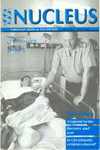Each January 400 students from all over the UK descend on the Hayes conference centre for CMF’s national student conference. It is the highlight of the CMF year and students often come back again and again for the excellent teaching and the chance to make new friendships and revive old ones.
Those that have been will remember that each year we invite a party of international students from the rest of Europe and the Former Soviet Union. CMF is just one of 90 similar organisations linked through ICMDA, the International Christian Medical and Dental Association. Contact between these groups is a great source of encouragement and leads to their mutual building up and strengthening.
But for international students attending Swanwick there can be significant difficulties, especially for those from Eastern Europe and the Former Soviet Union. English may be a second or third language, they may feel isolated as the only representative from their country and the upheaval of being in a new culture can stop them getting the most out of such a short stay.
The orientation week
For this reason, since 1999 the international participation at Swanwick has taken on a new dimension. An orientation week has taken place in London where students can acclimatise, make friends with the other international students, meet some London students and receive extra teaching, making the whole experience more valuable.
Last year sixteen students attended the week and were hosted by London students in their homes. They came from countries such as Hungary, Yugoslavia, the Czech Republic, Denmark, Latvia, Ukraine, Belarus, Georgia and Kazakhstan. Each morning they were given a Bible talk and lecture on ethics, then spent the afternoon visiting a medical unit. This year they visited an inner-city general practice, a neonatology unit and a hospice. All three visits were arranged by CMF graduates who worked there. The units were chosen because they reflected relevant ethical issues that could be discussed during the visit. This is especially relevant as these units may not have a counterpart in some of the delegates’ home countries.
Other free time was spent sightseeing, including a day trip to Oxford. The Oxford students made them feel very welcome, gave an excellent tour and even arranged a formal dinner in one of the halls. They took the opportunity to visit Magdalen college to see its ancient fragment of Matthew’s gospel, one of the oldest in existence.
We are forging ahead with this year’s plans. Invitations are sent out through the various Christian medical organisations and, where these do not exist, the local IFES groups. We hope particularly to attract more from Central Asia and from other countries where evangelical witness amongst medical students is weak.
Why is it important?
Some may question the usefulness of this venture and think it a waste of time and effort. Others may think it arrogant to say, ‘come and see how we do things in the UK’. But the results speak for themselves. The beneficial effects of international participation and of this pre-conference week in particular are several. Many of the students come from countries where Christian medical work is very basic. We in the UK are extremely privileged in this respect. We have well-organised conferences, excellent literature, group activities on all campuses and regional staffworkers to name a few things. Other countries have none of this and Christian students are left on their own with few effective role models to teach them how to be distinctive Christian doctors. It is not arrogance to say that we have things to offer students in other countries - it is simple gratitude to God and stewardship of his gracious gifts to us.
Time and again we have found that students who attend conferences like this one and those organised by ICMDA are changed by the experience. They return to their own countries with fresh ideas and enthusiasm and have frequently been instrumental in setting up or developing their own movements. Dutch students organised their first national students’ conference in March 2000, to which 150 came. This was largely due to a couple of students coming to ICMDA’s World Congress in South Africa in 1998 and then to Swanwick in 1999. Norwegians who attended the ICMDA European Conference last September are now planning their own conference for March. CMF movements in countries like Poland, Hungary, Romania and Albania have been greatly helped by participation in such conferences. These are just a fraction of the stories that could be told.
Besides all this, the benefits are by no means one-way. We in the UK have been so well-fed with Bible teaching and Christian input that we are in constant danger of morbid spiritual obesity. Our affluent lifestyles tempt us to rely more on our own money and talents than on God’s provision. Spending time with students who have faced great financial hardship and spiritual opposition, yet learnt to lean on God, is a humbling experience and one that we can learn much from. This is one reason why we give dedicated time in the main conference sessions to hearing from each of the countries represented and praying for them.
How can we be involved?
There are several ways that groups and individuals can contribute. Students in London are needed each year to offer accommodation; this is a great way to meet the students and often results in long-term friendships being built up. Those who live in the rest of the UK will have the chance to meet the students at conference. You can do a lot to make them feel welcome and may be able to start a friendship, or even buy them some books as a lasting reminder of their visit!
Groups and individuals can contribute financially to the project. The conference is substantially subsidised by CMF graduates each year so that students from less well-off countries are given free accommodation, conference and a book pack. For those in real hardship help is given with travel to and from the UK. All this costs money and any donations will help us expand what we can offer. Some CMF groups have established ongoing links with a particular medical school or country that have been a great success.
For those outside the UK (Nucleus goes to 43 countries), it doesn’t end there. Some of you will already run your own national student conferences. Why not think about inviting some students from surrounding countries to join you? ICMDA has a regular cycle of world and regional conferences that focus exclusively on building international links, but they only happen every four years. There is much that can be done in between these by national organisations building their own links. The goal of ICMDA is to have member groups in each of its regions working together to strengthen and learn from each other.
The world is increasingly becoming a global village and so for Christian medical students Jesus’ command to love our neighbour demands a global response. This is just one of the ways that we can reach out and fulfil the Lord’s command.
If you would like further information or wish to contribute in any way, do contact me and ask for more details.
































